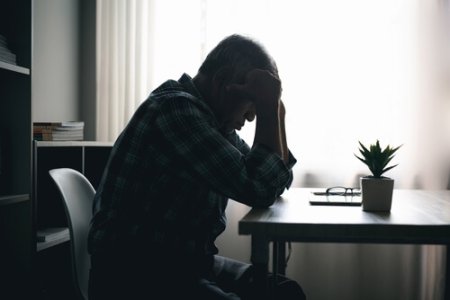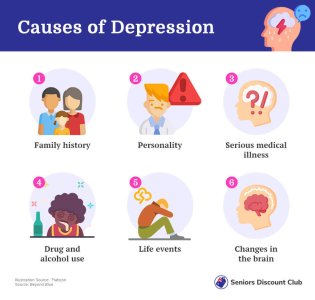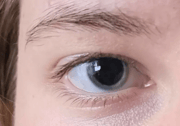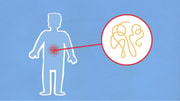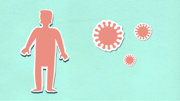Ask Joy: Depression Versus Sadness
- Replies 4
Note from the Editor:
This article was kindly written for the SDC by retired psychologist/ member @Joy Straw.
Depression is experienced in many different ways, but there are some similarities that can help to recognise if someone is struggling. Depression is more than sadness and has a negative effect on the way someone lives. The following will hopefully help to dispel some myths around the illness and help those suffering to find help. Depression is an illness and not something to feel shame over, as some people do. There are so many resources available that can be helpful.

Symptoms of Depression
‘One in 16 people in Australia are affected by depression every year. The good news is that depression can be managed with the right resources and support.’ — MindSpot.
Types of depression
Symptoms of depression in yourself or others
Changes in Thinking
Emotional changes
Feelings of being:
Behaviour changes (that need help ASAP)
First, do not tell yourself or them ‘to get over it’, ‘it’s not that bad’, or ‘look on the bright side’. Believe me, if they could, they would. If you are suffering, don’t be afraid to reach out online or in person (see the end of the article).
Connect with others
Physical and sensory activities
Get active, e.g., walk, run, cycle, swim, surf, do yoga, pilates, tai chi, or garden.
Change surroundings
Creative expression
Keep busy
R U OK?
I was working with a group of adults who had lost a loved one through death or divorce. At the end of the 10-week sessions, the group, mainly women, asked if anyone wanted to be part of a group hug. A quiet male voice, one of two men in the group, asked if he could join in. When everybody enthusiastically said ‘yes’, he quietly stated it was the first time he had been touched in over 12 months.
Don’t be afraid to ask R U OK? Not everyone can ask for help, but everyone can listen.
The following are some of the best places to find resources or to seek help. Don’t be afraid to reach out.

Telephone
Lifeline 13 11 14
Kids Helpline 1800 55 1800
Beyond Blue 1300 084 006
Suicide Call Back Service 1300 659 467
Online
Beyond Blue
Mindspot.
Mood Gym.
Black Dog.
Mensline.
Disclaimer: This is not intended to be a substitute for individual professional medical advice. We recommend speaking to your GP for a Mental Health Care Plan.
About the author: My name is Joy Straw, and I’ve been a counsellor and (now retired) psychologist working with couples and individuals, as well as children in crisis, for over 30 years. I am a widow with two children and three grandchildren and have recently moved to a retirement village and am loving life again.
Note from the Editor:
Interested in reading more from Joy? You can find all her articles here.
Looking for immediate support? Here is a list of more free mental health helplines.
You can ask Joy a question here.
You can sign up for SDC Rewards today—it starts at under 14 cents per day.
This article was kindly written for the SDC by retired psychologist/ member @Joy Straw.
Depression is experienced in many different ways, but there are some similarities that can help to recognise if someone is struggling. Depression is more than sadness and has a negative effect on the way someone lives. The following will hopefully help to dispel some myths around the illness and help those suffering to find help. Depression is an illness and not something to feel shame over, as some people do. There are so many resources available that can be helpful.
Tip
If you find yourself affected by this topic (and some people can be affected deeply), please see the end of the article for resources and phone numbers that are available.
‘Everyone experiences sadness at times. But depression is something more. Depression is extreme sadness or despair that lasts more than days. It interferes with the activities of daily life and can cause physical symptoms such as pain, weight loss or gain, sleeping pattern disruptions, or lack of energy. People with depression may also experience an inability to concentrate, feelings of worthlessness or excessive guilt, and recurrent thoughts of death or suicide.’
‘Depression is the most common mental disorder. Fortunately, depression is treatable. A combination of therapy and antidepressant medication can help ensure recovery.’
– American Psychological Association. Adapted from the Encyclopedia of Psychology.
‘Depression is the most common mental disorder. Fortunately, depression is treatable. A combination of therapy and antidepressant medication can help ensure recovery.’
– American Psychological Association. Adapted from the Encyclopedia of Psychology.
Symptoms of Depression
- Trouble concentrating – Intrusive thoughts,
- Feeling overwhelmed – Empty or numb,
- Isolation/withdrawing from family and friends – this significantly increased during and after COVID-19,
- Thoughts that things are hopeless and nothing good in life,
- Constantly tired.
‘One in 16 people in Australia are affected by depression every year. The good news is that depression can be managed with the right resources and support.’ — MindSpot.
Types of depression
- Clinical Depression,
- Persistent Depressive Disorder – Mild but long-term depression,
- Bipolar Disorder I & II – Mood swings and depressive lows to hypomanic episodes
- Postpartum Depression
Symptoms of depression in yourself or others
- Trouble concentrating – intrusive thoughts
- Feeling overwhelmed, empty, or numb
- Isolating themselves or withdrawing from family and friends (this significantly increased during and after COVID.)
- Thoughts that things are hopeless and nothing good in life
- Constantly tired
- Withdrawing from others at work, home, school or social
- Feeling like you don’t belong or won’t be accepted (a big one for teenagers)
- Feeling like you are a burden to other people
- Feeling like a failure or a disappointment?
- Feeling isolated or lonely
- Finding it hard to talk to people or refusing to talk at all
- Fighting, arguing or sarcasm with other people
Changes in Thinking
- Getting stuck on negative thoughts about self and the future
- Intrusive thoughts
- Trauma flashbacks
- Hard to concentrate or focus
- Being distracted
Emotional changes
Feelings of being:
- Trapped
- Overwhelmed
- Numb
- Hopeless(ness for the future)
- Worthless and alone
Behaviour changes (that need help ASAP)
- Self-harming – Seek help ASAP
- Suicide ideation/thoughts – If someone expresses suicidal thoughts, treat it seriously and get help immediately
- Suicidal plans – If someone tells you how they plan to die, stay with them and get immediate medical help
- Planning or thinking about dying
- If someone gives away precious items to their friends or family and they have been showing signs of the above changes, do not leave them and get medical intervention immediately.
First, do not tell yourself or them ‘to get over it’, ‘it’s not that bad’, or ‘look on the bright side’. Believe me, if they could, they would. If you are suffering, don’t be afraid to reach out online or in person (see the end of the article).
Connect with others
- Be around other people
- Text or call friends or family
- Connect to your culture
- Online, peer support, forum. E.g. Beyond Blue
- Call helplines. E.g. See the end of this article
- Contact your GP
Physical and sensory activities
Get active, e.g., walk, run, cycle, swim, surf, do yoga, pilates, tai chi, or garden.
Change surroundings
- Go outside into nature – hike, walk, gardening
- Spend time in a quiet place – library, museum, church
- Visit somewhere you can be around people, e.g., a cafe, park, shopping centre
- Go to a different room in the house
- Don’t stay in bed or in pyjamas (unless physically ill).
Creative expression
- Write – Journal, make plans for a holiday, write a letter
- Paint or draw
- Embroider or learn to knit/crochet
- Dance or make music
- Design or make fashion
- Be constructive – Woodwork or model-making
Keep busy
- Do cleaning or laundry
- Grocery shopping
R U OK?
I was working with a group of adults who had lost a loved one through death or divorce. At the end of the 10-week sessions, the group, mainly women, asked if anyone wanted to be part of a group hug. A quiet male voice, one of two men in the group, asked if he could join in. When everybody enthusiastically said ‘yes’, he quietly stated it was the first time he had been touched in over 12 months.
Don’t be afraid to ask R U OK? Not everyone can ask for help, but everyone can listen.
The following are some of the best places to find resources or to seek help. Don’t be afraid to reach out.
Telephone
Lifeline 13 11 14
Kids Helpline 1800 55 1800
Beyond Blue 1300 084 006
Suicide Call Back Service 1300 659 467
Online
Beyond Blue
Mindspot.
Mood Gym.
Black Dog.
Mensline.
Disclaimer: This is not intended to be a substitute for individual professional medical advice. We recommend speaking to your GP for a Mental Health Care Plan.
About the author: My name is Joy Straw, and I’ve been a counsellor and (now retired) psychologist working with couples and individuals, as well as children in crisis, for over 30 years. I am a widow with two children and three grandchildren and have recently moved to a retirement village and am loving life again.
Note from the Editor:
Interested in reading more from Joy? You can find all her articles here.
Looking for immediate support? Here is a list of more free mental health helplines.
You can ask Joy a question here.
You can sign up for SDC Rewards today—it starts at under 14 cents per day.

